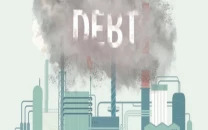Distorted policies: Dewan Petroleum finds gas, but govt not interested
Company files review petition in the Supreme Court after petroleum ministry declines to accept results of arbitration.

Distorted policies: Dewan Petroleum finds gas, but govt not interested
Despite the chronic shortage of gas in the country, the government has yet to give Dewan Petroleum a price for the gas the company has found in Safed Koh, forcing the firm to seek a ruling from the Supreme Court.
Dewan Petroleum, an oil and gas exploration company, filed a review petition after the one month settlement timeframe set by the apex court on October 18 expired on Sunday. The Supreme Court had asked the petroleum ministry to reach an ‘amicable solution’ with Dewan within 30 days in accordance with the Petroleum Concession Agreement (PCA) or else be forced to go through arbitration.
The petroleum ministry has been at loggerheads with Dewan Petroleum before. Indeed, the dispute between the two parties is whether the petroleum ministry had ever agreed to arbitration in the first place. Dewan claims that the petroleum ministry had agreed to such an arrangement.
According to the review petition filed by Dewan (a copy of which was made available to The Express Tribune), when the company first found gas in the Safed Koh sector (close to the Afghan border) on September 30, 2006, then-Prime Minister Shaukat Aziz appointed the attorney-general of Pakistan, an office then occupied by Makhdoom Ali Khan, to serve as an ‘arbitrator’ between the company and the ministry to set a price at which the state-owned gas pipeline system would buy gas from the field.
Dewan’s petition claims that the meeting was attended by then-Petroleum Secretary Ahmad Waqar as well as Dewan Ziaur Rehman, the chairman of Dewan Petroleum. Makhdoom Ali Khan resigned soon thereafter and was succeeded by Malik Muhammad Abdul Qayyum.
The company claims that several petroleum ministry officials – all of whom it names in its petition – met with the attorney-general on the matter. It also cites a reference sent by Waqar on November 21, 2006 to the law ministry, seeking their interpretation of the PCA, specifically the article dealing with gas pricing.
The ‘smoking gun’ as far as Dewan Petroleum is concerned is a letter written by Zaheer Alam, the director of the gas division at the petroleum and natural resources ministry, who wrote to then-President Pervez Musharraf stating that the arbitration decision of the attorney-general would be binding on both the ministry and the company. Dewan accepts the validity of that assertion.
On November 13, 2007, having heard the arguments from both the government and Dewan Petroleum, the attorney-general made a decision that appeared to go in the company’s favour and sent it to the law ministry. However, despite having admitted to binding arbitration, the government refused to set a price for gas from the Safed Koh field and has not yet taken any actions to settle the matter.
Dewan Petroleum, and its Austrian partner firm OMV, had been awarded an exploration contract under the Petroleum Policy 2001 and had been granted a provisional price of $2.80 per million British thermal units (mmbtu) should they find any gas. This price would be up for renegotiation once an actual find occurred. Yet once the company actually found gas, the government balked at offering what had then become the prevailing price: $3.75 per mmbtu.
Dewan is claiming not only that the government went back on its word, but that it is treating the company in a discriminatory manner. The government had awarded 84 contracts under the 2001 policy at the lower price but is now ready to convert 77 of those to the 2011 policy, which offers a rate of $6 per mmbtu.
The list of 77 fields includes many owned by companies that bought concessions years ago but have yet to begin exploration activities. It does not include Safed Koh. By contrast, Dewan Petroleum and OMV have collectively spent $200 million in exploration costs and now stand in default of the $40 million loan they obtained from the International Finance Corporation, a World Bank subsidiary.
“The government is willing to spend $18 per mmbtu importing liquefied natural gas (LNG), but is not willing to provide incentives to companies that have actually explored local fields,” said one industry source who wished to remain anonymous.
Senior petroleum ministry officials declined to comment on the matter, claiming they had not yet received any notices from the court.
Published in The Express Tribune, December 21st, 2011.



















COMMENTS
Comments are moderated and generally will be posted if they are on-topic and not abusive.
For more information, please see our Comments FAQ